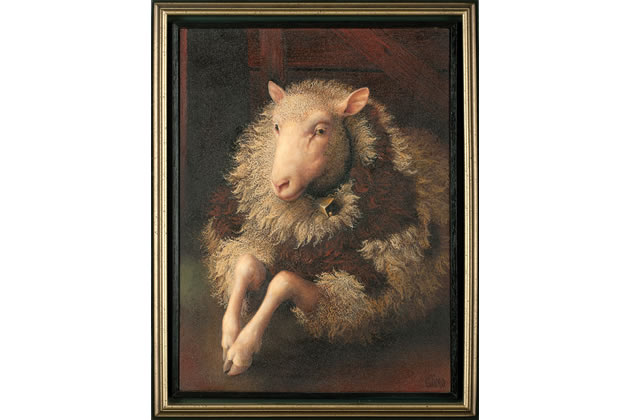pas•to•ralWith the full definition in hand, what might one expect from André Alexis's Pastoral? Sheep, a pastor, and a portrayal of idealized country life? Check, check, and check, we get all three. But Pastoral is also the common name for Beethoven’s Sixth Symphony, and this book echoes the structure of the musical composition, having five movements that follow Beethoven's intent:
adjective
1. (especially of land or a farm) used for or related to the keeping or grazing of sheep or cattle.
2. (in the Christian Church) concerning or appropriate to the giving of spiritual guidance.
noun
1. a work of literature portraying an idealized version of country life.
1. Awakening of cheerful feelings upon arrival in the country.And as I read on this blog, Alexis gave himself even more rules while writing this book:
2. Scene at the brook.
3. Happy gathering of country folk.
4. Thunderstorm; storm.
5. Shepherd's song; cheerful and thankful feelings after the storm.
Pastoral is musical in structure. In every chapter, there are 5 elements that absolutely must be mentioned: bread, candle, sheep, prayer book, water. But the order in which they appear varies in this way:I want to include all of this information because, even though Pastoral is a mere 160 pages, there is meaning and purpose behind every word of it. Written in the Southern Ontario Gothic style (complete with mysteries, miracles, and small town interconnectiveness), the story is set in the fictional hamlet of Barrow (which itself is defined as: a large mound of earth or stones over the remains of the dead) and use is made of that:
chapter one: a, b, c, d, e
chapter two: b, c, d, e, a
chapter three: c, d, e, a, b
chapter four: d, e, a, b, c
chapter five: e, a, b, c, d
where a = bread, b = candles, c = sheep, d = prayer book, e = water
The earth, which has only two words, intoned the first of them ('life') noisily, with birdsong, the gurgle and slap of rushing water, the suck and squelch of the ground itself. Not that its other word ('death') was banished. As they walked in a field, Father Pennant spotted a small clearing over which bleached animal bones (ribs, skulls, backbones and limbs) were strewn. Among and through the bones, young grass grew. It was like an open ossuary.This is Barrow as first seen by Father Pennant: a young priest taking on his first parish, who is initially disappointed by the rural setting; mistakenly thinking that small towns mean small problems, small impact. Soon enough, though, the priest is settled into the community, and even more important than the connections that he makes to the people of his parish are the connections that he makes to the natural surroundings, prompting a crisis of faith in which he can't decide on the relative primacy of God and Nature and Love.
It occurred to him that Barrow itself was neither good nor evil but was, instead, animated by whatever it was that animated the land, the thing that animated each and every one of them and, so, revealed itself in its hiddenness. In fact, one felt, or he felt as he walked -- blasphemous though the thought was -- that God was only an aspect of the hidden, an idea brought into being by man in order to point to a deeper thing that had no name and reigned beyond silence.Pastoral is peopled with fascinating characters, and because of the book's length, the plot is necessarily tight and stripped down, covering just eight months (and for a book set in Canada, it's refreshing that it's the winter that's omitted). Dialogue is natural and, consistently, the writing is interesting and earthy.
After Tomasine's burial, the ground in the graveyard was more dense than it had been, with another body -- like cold, curdled earth -- to digest. The currents of air that visited Barrow had one less person to circle or caress. And the wind as it blew through town made a sound ever so slightly altered. The ants had one less hazard, the birds one less predator, the worms one more meal.Needless to say, I enjoyed Pastoral very much; a fascination that started with the cover art -- Lady Sheep by Lindee Climo:
Kennedy (my Art History lover) was also intrigued by this painting, thinking it looked like an Elizabethan lady with a ruffed collar. I almost feel like I've seen this image before, and what's lost in this reproduction I found is how naked and fragile the skin on the face and legs looks; I find it uncomfortable (yet beautiful) to look at, and that was almost my experience while reading Pastoral. Another thing I liked in the book: right on the first page it mentions the city I live in, and as I've never read it in fiction before, it helped to draw me in; to make an immediate connection (it also mentioned the university where my Art History lover studies, so...). And something I didn't like: as Alexis wrote above, he included his five elements in every chapter, and while that's not distracting when he's talking about candles and water and sheep and bread, it was distracting that all of these non-religious characters had prayer books -- I wish he had chosen a different fifth element because, until I stumbled on that blog (which has a much better and definitive review of Pastoral), it was the sore thumb in a book of smooth prose.
2014 Finalists for the Rogers Writers' Trust Fiction Prize (with my personal ranking):
Individual reviews of Alexis' Quincunx:


